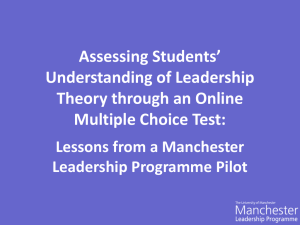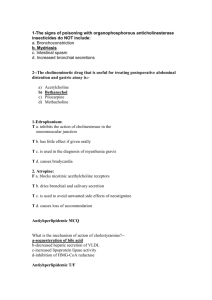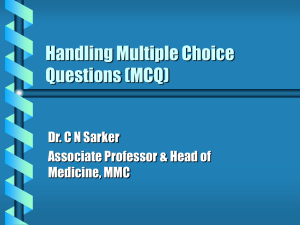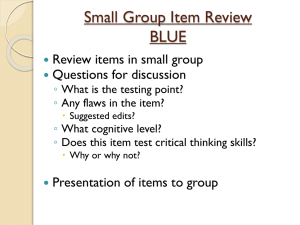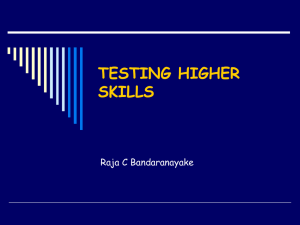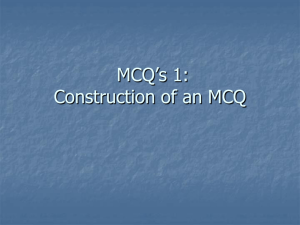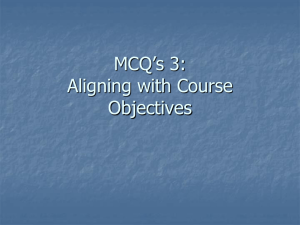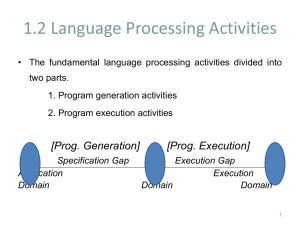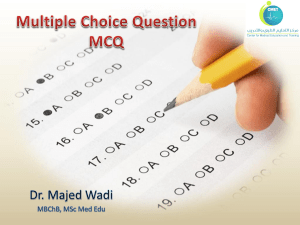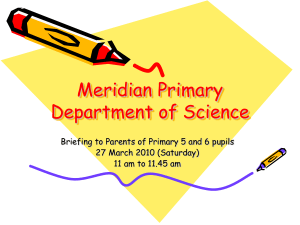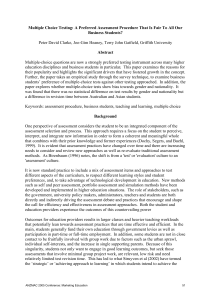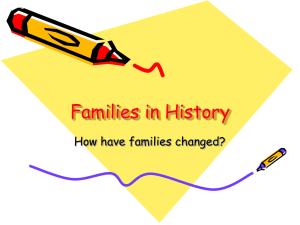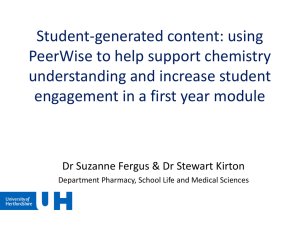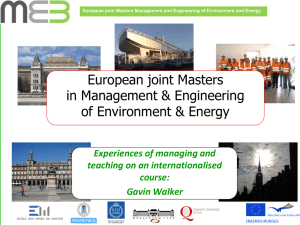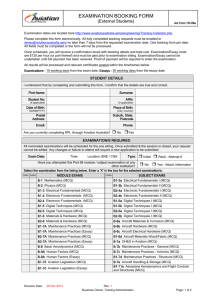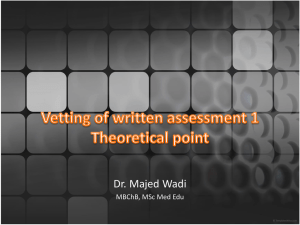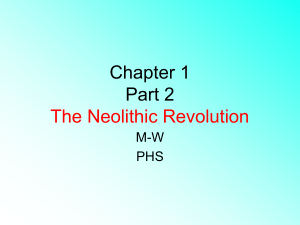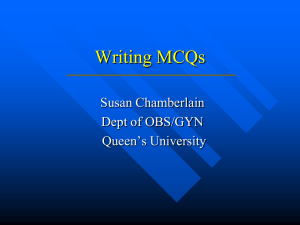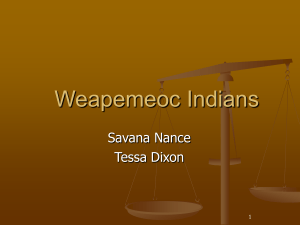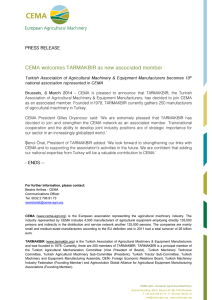AP European History
advertisement
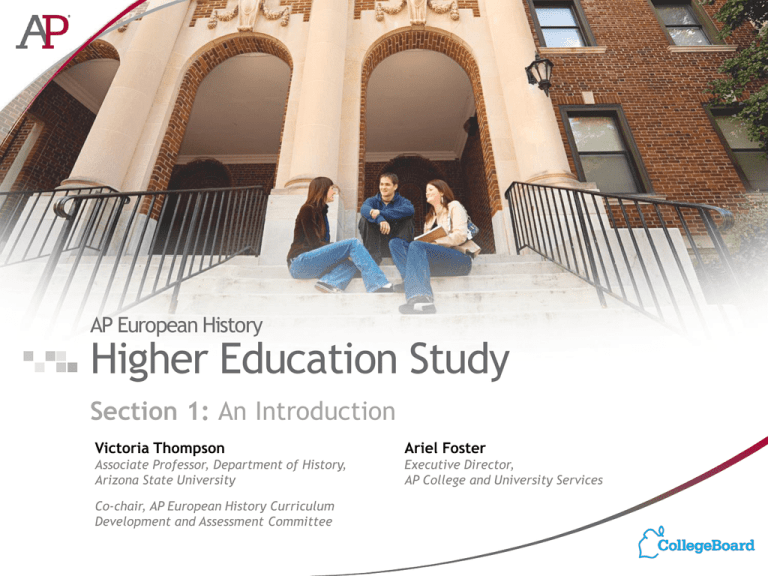
AP European History Higher Education Study Section 1: An Introduction Victoria Thompson Ariel Foster Associate Professor, Department of History, Arizona State University Executive Director, AP College and University Services Co-chair, AP European History Curriculum Development and Assessment Committee Topics I. AP Program Overview II. Overview of AP European History Redesign III. What We’re Asking You to Do …and Why An Overview of the AP Program In 2011, 3,293 colleges and universities worldwide received AP Exam scores. College Faculty Are Involved in Every Aspect of AP On an annual basis, more than 5,000 college faculty participate in AP. Course & exam content Standards alignment Professional development Curriculum studies Comparability studies AP teacher training Curriculum frameworks Standard setting studies Question writing and review Pilot draft exam questions AP and pre-AP strategies workshops for teachers AP Course Audit AP teacher syllabus evaluations Exam scoring Exam scoring as Chief Readers and Readers Standards alignment Institutions Participating in AP College Comparability Studies Trends in the General AP Student Population 2002 2012 8% underrepresented minority 24% underrepresented minority 6% low income 21% low income Trends in the AP European History Student Population 2002 10% underrepresented minority 4% low income 2012 15% underrepresented minority 14% low income Key Questions About AP Student Outcomes and Answers Based on Recent Research How do AP students perform in the subsequent course after earning placement or credit? AP Students Succeed in Subsequent Courses In multiple studies, AP students exempted from the introductory course did as well as, or better than, non-AP students in the subsequent course. AP European History Students Are More Likely to Major in a Closely Related Discipline than Non-AP Students Majors in History, International Affairs, and Political Science Non-AP Students 4% AP European History Students 11% 0 5 10 Source: AP Students in College: An Analysis of Five-Year Academic Careers (2007) Rick Morgan and John Klaric. 15 AP European History Higher Education Study Section 2: The AP European History Redesign Victoria Thompson Arizona State University AP European History Curriculum Development and Assessment Committee Why We’re Changing the AP European History Course Encourage in-depth learning in course Prepare for success A Tour of the AP European History Curriculum Framework AP European History Curriculum Framework historical thinking skills historical themes Key concepts Learning objectives Overview of the AP EH Curriculum Framework Defining Course Themes Provide structure for the course as a whole Defining Key Concepts Within Period 3: c. 1815 – c. 1914 Defining Supporting Concepts Within Key Concept 3.3 Key Concept 3.3 The problems of industrialization provoked a range of ideological, governmental, and collective responses. I. II. III. Defining Supporting Concepts Within Key Concept 3.3 Key Concept 3.3 The problems of industrialization provoked a range of ideological, governmental, and collective responses. I. II. III. Defining Key Concept Details Key Concept 3.3.I Ideologies developed and took root throughout society as a response to industrial and political revolutions. A. Liberals emphasized popular sovereignty, individual rights, and enlightened selfinterest but debated the extent to which all groups in society should actively participate in its governance. B. Radicals in Britain and republicans on the continent demanded universal male suffrage and full citizenship without regard to wealth and property ownership; some argued that such rights should be extended to women. C. Conservatives developed a new ideology in support of traditional political forms that was based on the idea that human nature was not perfectible. D. Socialists called for a fair distribution of society’s resources and wealth, and evolved from a utopian to a Marxist “scientific” critique of capitalism. E. Anarchists asserted that all forms of governmental authority were unnecessary, and should be overthrown and replaced with a society based on voluntary cooperation. F. Nationalists encouraged loyalty to the nation in a variety of ways, including romantic idealism, liberal reform, political unification, racialism with a concomitant anti-Semitism, and chauvinism justifying national aggrandizement. G. A form of Jewish nationalism, Zionism, developed in the late 19th century as a response to growing anti-Semitism in both Western and Eastern Europe. Illustrative Examples Key Concept 3.3.1 The problems of industrialization provoked a range of ideological, governmental, and collective responses. I. Ideologies developed and took root throughout society as a response to industrial and political revolutions. AP Exam questions will not ask students about these topics A. Liberals emphasized popular sovereignty, individual rights, and enlightened self-interest but debated the extent to which all groups in society should actively participate in its governance. Teachers have flexibility to use examples of liberals such as the following: Jeremy Bentham, Anti-Corn Law League, John Stuart Mill Learning Objectives for Poverty and Prosperity Students demonstrate understanding of how capitalism has developed as an economic system. In particular, students can… PP-1 Explain how and why wealth generated from new trading, financial, and manufacturing practices and institutions created a market and then a consumer economy. PP-2 Identify the changes in agricultural production and evaluate their impact on economic growth and the standard of living in preindustrial Europe. PP-3 Analyze the reasons for the emergence and development of self-interest in economic practice and theory. PP-4 Explain how geographic, economic, social, and political factors affected the pace, nature, and timing of industrialization in Western and Eastern Europe. PP-5 Explain how the development of new technologies and industries — as well as new means of communication, marketing, and transportation — contributed to expansion of consumerism and increased standards of living and quality of life in the 19th and 20th centuries. PP-6 Analyze the origins, characteristics, and effects of the post–World War II “economic miracle” and the economic integration of Europe (the Euro zone). Learning Objectives Connect Key Concepts Thematically Across the Different Historical Periods Analyze the reasons for the emergence and development of self-interest in economic practice and theory. PP-3 Period 2 Period 3 Overview of the AP EH Curriculum Framework Assessing Student Understanding of the Learning Objectives Exam questions are designed to… historical thinking skills long-term, significant historical developments flexibility Why Are Multiple Choice Questions Important? Multiple choice questions help maintain the meaning of an AP score over time. Within a subject, equators are the subset of multiple choice questions that are common across examination forms and years. Equators allow comparison and consistency between exam forms over time. Draft MCQ Set: Stimulus Questions 1-3 Seed Yields for Wheat and Barley 10 5 1600 1650 * Seed yield (or crop yield) is a ration of the number of seeds of grain harvested for each seed sown. Source: Norman J. G. Pounds, A Historical Geography of Europe, Volume II: 1500-1840, Cambridge University Press, 1979, p. 182. 1700 1750 Year 1800 Great Britain and the Low Countries France, Spain, and Italy Central Europe and Scandinavia Eastern Europe Draft Multiple Choice Question (MCQ) Set: Question 1 The patterns shown on the graph above contributed most directly to which of the following? (A) (B) (C) (D) Seed Yields for Wheat and Barley 10 5 1600 1650 1700 1750 1800 Year Great Britain and the Low Countries France, Spain, and Italy Central Europe and Scandinavia Eastern Europe Draft Multiple Choice Question (MCQ) Set: Question 1 The patterns shown on the graph above contributed most directly to which of the following? (B) Skills: • Causation • Interpretation Learning Objective: Key Concept: Poverty and Prosperity-4 The Agricultural Revolution produced more food using fewer workers; as a result, people migrated from rural areas to the cities in search of work. Explain how geographic, economic, social, and political factors affected the pace, nature, and timing of industrialization in western and eastern Europe. 2.4 IV A Draft Multiple Choice Question (MCQ) Set: Question 2 Apart from the changes in seed yield shown on the graph above, which of the following most affected Europe’s ability to feed itself in the period 1600-1800? (A) The creation of large cash-crop plantations in the Americas Seed Yields for Wheat and Barley 10 5 1600 1650 1700 1750 1800 Year Great Britain and the Low Countries France, Spain, and Italy Central Europe and Scandinavia Eastern Europe (B) The cultivation of New World crops in Europe (C) The widespread mechanization of agriculture (D) The decreasing tendency of armies to target civilian populations during wartime Draft Multiple Choice Question (MCQ) Set: Question 2 Apart from the changes in seed yield shown on the graph above, which of the following most affected Europe’s ability to feed itself in the period 1600-1800? Skill: (D) The cultivation of New World crops in Europe • Causation Learning Objective: Key Concept: Interaction of Europe and the World-5 The exchange of new plants, animals, and diseases—the Columbian Exchange— created economic opportunities for Europeans and facilitated European subjugation and destruction of indigenous peoples, particularly in the Americas Evaluate the impact of the Columbian Exchange — the global exchange of goods, plants, animals, and microbes — on Europe’s economy, society, and culture. 1.4 IV B Draft Multiple Choice Question (MCQ) Set: Question 3 In the late 1700s and early 1800s, liberal political economists in western Europe used information similar to the data shown in the graph to argue that Seed Yields for Wheat and Barley 10 5 1600 1650 1700 1750 1800 Year Great Britain and the Low Countries France, Spain, and Italy Central Europe and Scandinavia Eastern Europe (A) governments should require landholders to make agricultural improvements (B) the export of food crops and other agricultural products should be restricted (C) agricultural work had moral and physical benefits that were superior to those of industrial labor (D) abolition of common agricultural land holdings would result in greater agricultural productivity Draft Multiple Choice Question (MCQ) Set: Question 3 In the late 1700s and early 1800s, liberal political economists in western Europe used information similar to the data shown in the graph to argue that Skills: (D) abolition of common agricultural land holdings would result in greater agricultural productivity • Contextualization • Use of Evidence Learning Objective: Key Concept: Interaction of Europe and the World-5 The exchange of new plants, animals, and diseases—the Columbian Exchange— created economic opportunities for Europeans and facilitated European subjugation and destruction of indigenous peoples, particularly in the Americas Evaluate the impact of the Columbian Exchange — the global exchange of goods, plants, animals, and microbes — on Europe’s economy, society, and culture. 1.4 IV B Draft Short Answer Question 4 questions per section; 50 minutes total The following four factors were important influences on European countries’ drive to acquire overseas colonies: Christian missionary zeal Commercial competition among European powers Notions of European racial superiority Political rivalries within Europe (A) Choose ONE specific event or process related to European colonization and imperialism in the period 1450–1914, and then explain how ONE of the four factors listed above influenced that event or process. (B) Explain WHY the factor you chose for A had a stronger influence on the event or process than any of the other three factors listed above. Draft Short Answer Question 4 questions per section; 50 minutes total The following four factors were important influences on European countries’ drive to acquire overseas colonies: Christian missionary zeal Commercial competition among European powers Notions of European racial superiority Political rivalries within Europe Skills: Learning Objectives: • Causation Interaction of Europe and the World-1, 2, 3 • Comparison Assess the relative influence of economic, religious, and political motives in promoting exploration and colonization. Analyze the cultural beliefs that justified European conquest of overseas territories and how they changed over time. Analyze how European states established and administered overseas commercial and territorial empires. Document-Based Question 1 question; 60 minutes Analyze the influence of ideas about gender on the reign of Elizabeth I and explain how Elizabeth responded to these ideas. Skills: Learning Objectives: • Contextualization States and Other Institutions of Power-2, 11 • Argumentation • Use of Evidence • Synthesis Individual and Society-5 • Explain the emergence of and theories behind the New Monarchies and absolutist monarchies, and evaluate the degree to which they were able to centralize power in their states. • Analyze how religious and secular institutions and groups attempted to limit monarchical power by articulating theories of resistance to absolutism, and by taking political action. • Analyze how and why the nature and role of the family has changed over time Document Based Question (DBQ) Sources Document Based Question: Analyze the influence of ideas about gender on the reign of Elizabeth I and explain how Elizabeth responded to these ideas. Draft Question: Long Essay Choice between 2 questions; 35 minutes Analyze whether or not the revolutions of 1848 can be considered a turning point in European political history. - orAnalyze whether or not the First World War I (19141918) can be considered a turning point in European intellectual and cultural history. Draft Question: Long Essay Choice between 2 questions; 35 minutes Analyze whether or not the revolutions of 1848 can be considered a turning point in European political history. Skills: Learning Objectives: • Causation States and Other Institutions of Power-4, 14, 17 • Continuity and Change Over Time • Periodization • Argumentation • Synthesis • Analyze how new political and economic theories from the 17th century and the Enlightenment challenged absolutism and shaped the development of constitutional states, parliamentary governments, and the concept of individual rights. • Analyze the role of warfare in remaking the political map of Europe and in shifting the global balance of power in the 19th and 20th centuries. • Explain the role of nationalism in altering the European balance of power, and explain attempts made to limit nationalism as a means to ensure continental stability. Draft Question: Long Essay Choice between 2 questions; 35 minutes Analyze whether or not the First World War I (1914-1918) can be considered a turning point in European intellectual and cultural history. Skills: Learning Objectives: • Causation Objective Knowledge and Subjective Visions-8, 10, 13 • Continuity and Change Over Time • Periodization • Argumentation • Synthesis • Explain the emergence, spread, and questioning of scientific, technological, and positivist approaches to addressing social problems. • Analyze the means by which individualism, subjective experience, and emotion came to be considered a valid source of knowledge. • Explain how and why modern artists began to move away from realism and toward abstraction and the nonrational, rejecting traditional aesthetics. AP European History Higher Education Study Section 3: Overview of Independent Review Assignment and the Advanced Strategy Labs (Virtual Focus Groups) Ariel Foster Executive Director, AP College and University Services Why Are We Asking for Your Feedback? To confirm To explore and better understand To better understand Structure of the AP® European History Curriculum Framework 4 Historical Periods with 20 Key Concepts Supporting Concepts (I, II, III,…) Thematic-Based Learning Objectives Concept Details (A, B, C,…) Historical Thinking Skills The Independent Review Feedback Form Key Concept 1.1 The worldview of European intellectuals shifted from one based on the authority of scripture and the ancients to one based on inquiry and observation of the natural world. (Please reference pages 34-36 in the Curriculum Framework for further information.) 1. How important is each of the following to success in subsequent learning experiences in history? That is, how important is it that students bring this knowledge with them to courses that follow your introductory European history (c. 1450 to the present) course? Use a scale of 1 to 10, where 1 = Not at all important for success in subsequent courses and 10 = Essential for success in the subsequent course Click on the highlighted box to the right of each item and type your response (i.e., 1, 2, 3, 4, 5, 6, 7, 8, 9, 10) into the box to the right of each item. Supporting Concept and Concept Details Rate 1 to 10 1=Not at all important 10=Essential 1.1. I A revival of classical texts led to new methods of scholarship and new values in both society and religion. 1.1. I. A Italian Renaissance humanists promoted a revival in classical literature and created new philological approaches to ancient texts. Some Renaissance humanists furthered the values of secularism and individualism. 1.1. I. B. Humanist intellectual activities challenged the institutional power of universities and the Roman Catholic Church, and shifted the focus of education away from theology toward the study of the Greek and Roman classics. 1.1. I. C. Admiration for Greek and Roman political institutions supported a revival of civic humanist culture in the Italian city-states. 1.1. I. D. The study of Greek and Roman texts produced new models for individual and political behavior. Timeline for the Independent Review Assignment September 17th September 17-28, 2012 September 28, 2012 Virtual Focus Groups Dates of the virtual focus groups: October 3, 7-9 pm ET or October 4, 7-9 pm ET hlee@harrisinteractive.com The Advanced Placement Program® (AP®) European History: Higher Education Study Appendix Draft MCQ Set: Stimulus Questions 1-3 are based on the following passage. Galileo Galilei, excerpt from The Starry Messenger, a treatise outlining Galileo’s astronomical discoveries using a telescope, including his discovery of four of Jupiter’s moons, 1610. Draft Multiple Choice Question (MCQ) Set: Question 1 Galileo’s reference in the passage to an anecdote from the history of ancient Rome and his knowledge of classical mythology would likely have been interpreted by his contemporaries as (A) an indicator of his hostility to new ideas and new modes of discovery (B) a normal and expected part of humanist discourse (C) troubling evidence of Galileo’s rejection of Christianity (D) an indirect appeal for the political unification of Italy Draft Multiple Choice Question (MCQ) Set: Question 1 Galileo’s reference in the passage to an anecdote from the history of ancient Rome and his knowledge of classical mythology would likely have been interpreted by his contemporaries as Skill: (B) a normal and expected part of humanist discourse • Contextualization Learning Objective: Key Concept: Objective Knowledge and Subjective Visions5 A revival of classical texts led to new methods of scholarship and new values in both society and religion. Analyze how the development of Renaissance humanism, the printing press, and the scientific method contributed to the emergence of a new theory of knowledge and conception of the universe. 1.1 I Draft Multiple Choice Question (MCQ) Set: Question 2 Which of the following generalizations about scientists of the early modern period in Europe is best supported by the passage? (A) They valued their academic freedom and steered clear of associating with political authority. (B) They thought scientific knowledge would be best advanced through the rediscovery of lost ancient Greek and Roman scientific texts. (C) They believed their discoveries had advanced scientific knowledge further than it had been even in classical antiquity. (D) They continued to express belief in magic and the supernatural, even as they made important discoveries through empirical observation of natural phenomena.
